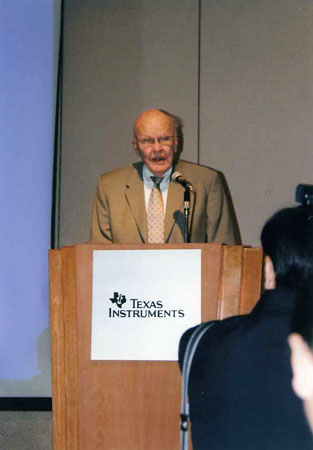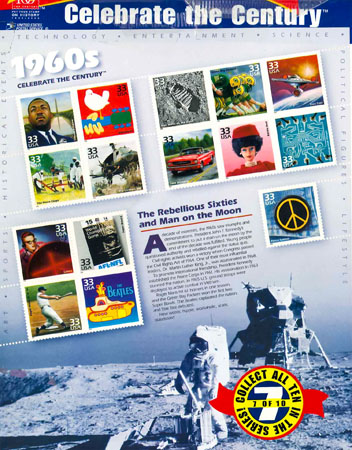3) I am not a Scientist, but an Engineer.


Picture A(Left) Jack Kilby speaking at his last press conference in Japan.
Picture B(Right) Commemorative stamps which were handed out at that time.
The last opportunity for me to meet Kilby was on September
9th, 2000, at a press conference in Tokyo. After a short comment by Kilby,
we moved onto the Q&A session and I first asked, “Since your last visit
to Japan, is there anything this time that has left a deep impression in your
mind?” In reply, he said in his faltering way of speech he replied, “What
impressed me the most was that I saw people, even as young as elementary school
children with a mobile phones in one hand and talking, as if it was completely
natural. Like the ripples generated from a stone thrown into a pond, this
degree of influence would exceed any inventor's expectations.” Completely
unexpected at the time, Kilby would be the recipient of the Nobel Prize in
Physics just ten days later. Twenty-five years earlier during my interview
with Kilby, I asked him about the possibility of winning the Nobel Prize,
but could not get a specific answer. As the IC is just integrated transistors,
it wasn’t acknowledged as new or original in the field of physics. This perspective
was established in the fields of academics and the industry, and Kilby perhaps
thought the same.
Contrary to these thoughts, luck would be by his side and with the discovery
of the IC and its unbelievable effect on society, the Nobel Prize Committee
perhaps presented Kilby as “the last recipient of the 20th century”.
Upon finding out the news he was chosen for the Nobel Prize, usually quiet
and simple Kilby made a short comment saying, “It is a great honor to receive
the Nobel Prize, the most prestigious award of all. When I heard I would be
receiving it, I was pleasantly surprised and filled with appreciation.”
Come to think of it, Kilby had a habit of saying, “I'm not a scientist, I'm
an engineer.” In other words, not a scientist, but an engineer to be given
the Nobel Prize in Physics shows that this technological accomplishment caused
an impact large enough to affect the scientific world.
On June 6th, 2005, five years after receiving the Nobel Prize, Jack St. Clair
Kilby passed away at the age of 81 in Dallas, Texas.
| To page top | To Part 2 index |